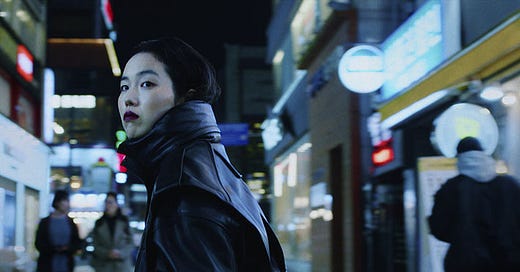“All the People I’ll Never Be.” French-Cambodian director Davy Chou’s working title for his film Return to Seoul, which he used until the film’s acquisition at Cannes, evokes desire and angst—a feeling of grasping at something that cannot exist. At the same time, it’s charged with dejection, and once you reread it enough times, contentment with letting go of the things you’ll never know. The film’s working title captures its essence: a whirlwind tale of metamorphosis and surrender that mutates into something strangely peaceful.
A character study of a free-spirited French adoptee who returns to her birthplace of South Korea on a whim, Return to Seoul is as unpredictable and unforgettable as its impulsive heroine. Part The Worst Person in the World and part Millennium Mambo, Return to Seoul abridges seven years in the life of Freddie (Park Ji-min), who visits Seoul numerous times despite knowing the place is “toxic” for her. Though it deals with international adoption and diasporic experiences, the film taps into a universal sense of feeling adrift, and will resonate with anyone who’s ever felt a bit lost.
On her first night in Seoul, Freddie brings together three different groups of strangers to get drunk together until dawn, without speaking a lick of Korean. She has a face from “ancient, ancestral Korea,” one of her new friends remarks, but she can’t begin to fathom its culture of honorifics and drinking etiquette. She drops by the country’s largest international adoption agency looking for answers, but gets frustrated by the strict bureaucracy that governs adoptees searching for their birth parents.
When Freddie does inch closer to what she’s looking for, her first instinct is to run away, but it becomes much too late. Return to Seoul is brutal in its depiction of the remorse and pain that underscores Freddie’s relationship with her birth parents, yet it manages to find humor in the things that get lost in translation. Thomas Favel’s slick cinematography captures Freddie at parties, in crowds, and with romantic partners, yet never loses sight of the fact that she is completely on her own.
First-time actress Park Ji-min plays Freddie, one of the most memorable characters of last year in a thorny, intuitive performance. Incapable of ever looking back, Freddie throws herself into every experience or identity available, shedding whatever doesn’t fit. She works as an arms dealer, she dabbles in polyamory, she goes vegan. She dances to techno alone and goes home with the DJ.
That doesn’t mean any of it sticks, though. By nature, Freddie pushes people out of her life as readily as she gets a new haircut (which is, often). That makes her pursuit of her biological mother—the only person who’s ever turned the tables on her—all the more visceral.
Somewhat unbeknownst to herself, Freddie hopes that the mystery of her biological parents could finally give her a sense of identity and peace. Return to Seoul tackles the pervasive sense of lostness that many feel, and the belief that finding answers to the big, haunting questions of our lives could fill the void. But it’s exactly that: a belief. Freddie’s journey is proof that identity is not so much a question to be answered, but a living thing, constructed, destroyed, and reinvented indefinitely.
By the end of the film, Freddie is in her early thirties. It’s unclear where she is in life exactly. But we’ve spent seven years in her company now, and it’s time to let go. Wherever she ends up, she’ll be okay.




You're the writer I'll never be